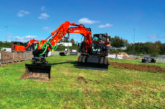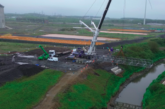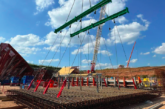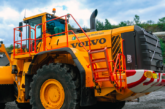Working safely on or next to roads is the new campaign from the International Powered Access Federation (IPAF), launched at the bauma 2019 expo in Messe München, Munich, Germany, 8-14 April.
IPAF’s Street Smart safety campaign outlines the dangers of using Mobile Elevating Work Platforms (MEWPs) on or next to roads. With the risk of being struck by a passing vehicle such as bus or truck, prior planning is needed so the MEWP can operate safely.
Tim Whiteman, CEO & MD of IPAF, comments: “MEWPs are designed to safely conduct temporary work at height in just about every environment, including on roads or in public places. However, being hit by a bus or truck while operating a MEWP is a leading cause of serious injury or death, according to our accident analysis.
Andrew Delahunt (pictured), IPAF’s Technical & Safety Director, says: “These accidents are almost always catastrophic. It is critical to segregate the working area to have separation from traffic. Operators should ensure they are seen by using signs, cones, beacons and high-vis clothing.”
Key points of guidance in the campaign include:
Plan ahead – Assess risk; develop and use a traffic management scheme.
Be visible – Wear hi-vis PPE to position cones/signs. Ensure vehicles are conspicuous (use flashing beacons/rear chevrons) and work areas well lit.
Manage traffic – Use temporary traffic lights or close roads to separate the working area. Use signs and cones for maximum warning to oncoming vehicles.
Implement an exclusion zone – Segregate the working area from passing vehicles. Position the MEWP so it does not overhang into traffic.
Load and unload safely – in a well-lit area, away from traffic or obstructions. When unloading next to a road make sure it is segregated from traffic
Andrew Delahunt adds: “This campaign highlights key risks and how to avoid them. We hope that, along with previous IPAF campaigns such as Plan Ahead for Safety and Back to Basics, it will continue to help people use powered access safely.”
Further guidance is available on using MEWPs alongside roads with additional detail on risks and safe operating procedures. For more information on all of IPAF’s safety campaigns and links to relevant technical guidance visit www.ipaf.org/safe or find your nearest office or representative via www.ipaf.org/contact









